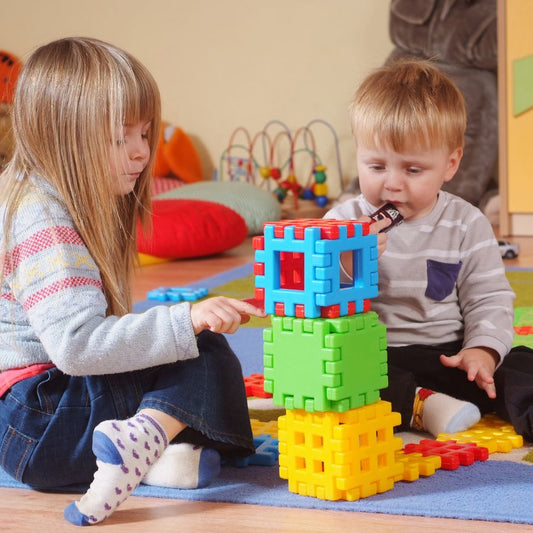Why my newborn doesn’t sleep at night? He used to go to sleep easily, why does my newborn wake up crying now? He’s sleepy but struggles to fall asleep... Baby sleep problems are very common, and often appear after four months of age.
If you've been struggling with your baby's sleep for weeks and have little energy left, don't let it get you down: read this article first, it may help you understand where you can start to tackle the problem.
Newborn never sleeps
Literally speaking, this cannot be true, yet it does actually feel like he never sleeps. You spend a good part of your day trying to get your baby to sleep, or a good part of the night awake with him.
You’ve sought advice, you’ve spoken to your doctor or NHS health advisor about it, you understand that sleep is essential for your infant’s development and that for a baby, lost sleep can’t be recovered, and this only increases your anxiety about the situation, without leading to anything positive! You’re still trying to figure out what you actually need to do in practice.
First, try to understand why is your infant not sleeping. Let's try to fathom it out together.
Newborn not sleeping at night
Let's start with a basic assumption: a baby's sleep is not the same as an adult's, it’s broken up into more intervals. In other words, newborn sleep cycles are shorter than ours (lasting about 30-40 minutes).
During the first three months, this means they sleep fewer hours than we do consecutively at night, which is why they wake up after a few hours and just don't seem to want to go back to sleep.
Added to this is the fact that when a baby is born there’s no difference between night and day for them, in fact their sleep and wake windows are almost identical each 24 hours.
It’s only starting from around four months old that babies begin to acquire a circadian rhythm similar to ours and begin to sleep longer at night. This is why they sometimes experience what we call the ‘ four month sleep regression ‘, because the sleep pattern of infants changes around this time.
When nighttime sleep issues appear after a baby turns four months, it’s most likely due to the fact that they aren’t simply getting enough sleep throughout the day.
Newborn not sleeping enough during the day
Does your infant only sleep for short intervals during the day (maximum of 30-40 minutes)? Unfortunately, in these cases, the rule that if a newborn sleeps more during the day, they will sleep better at night does not apply.
Of course, it’s true that every baby is different and some just need less sleep than others, but during the first months of life, newborns should also sleep a few hours during the day.
A nap in the morning about two hours after waking up (a nap should generally last 1-1.5 hours for a young baby) and then a couple of hours of continuous sleep early afternoon, around 1pm. Many babies also need another nap later on in the afternoon.
For babies (and often also for adults) the rule does not apply that if they do not sleep during the day, they will sleep more at night because they’ll be more tired. In fact, exactly the opposite is true: if you have an over tired newborn, who generally does not sleep enough throughout the day, they will almost certainly not sleep at night either, simply because he’ll be too tired, fussy, and not relaxed enough for dozing!
He's sleepy but my newborn refuses to sleep
Sleep means surrendering yourself, and for a baby this can be exhausting. The older they get, the more difficult it is to disengage babies from their wake time, when they play and explore the environment around them.
It’s therefore only normal that they will pass through infant sleep stages of taking longer to fall asleep. If, however, minutes turns to hours, then something is wrong.
He’s probably overtired: has he missed his sleep window? Was his last nap too short?
There may be occasional special days, such as a trip out of town, a meal out... all of which can disrupt your baby's sleep schedule. If it only happens now and again, no need to worry. Nothing will happen, especially as a baby with a solid sleep routine will not be carrying any previous fatigue and will cope with a little sleep deprivation.
If, on the other hand, your baby continues to struggle to fall asleep and it becomes more a persistent problem, ask yourself these questions: is he getting enough sleep during the day? Try putting your baby down for a nap two hours after waking up, creating a soft environment with dim lighting, no noise, no stimulation.
What to do if your newborn won’t settle
Let's cut to the chase: what can you do to help your baby sleep? (And allow you parents to get back to sleep, which is just as important!). Here are some practical tips:
1. Try to understand why your newborn doesn’t sleep
Is their sleeping environment right: dark, no noise, not too hot? Is your infant overtired? Does he wake up frequently and struggle to fall back asleep on his own? Does he only fall asleep when being held or while being fed? We take a look at each of these aspects in the following paragraphs.
2. Create a sleep-friendly environment
Check your baby’s room temperature (ideally between 18 and 20 degrees), make sure there are no loud noises and turn off the lights. Infants and toddlers up to the age of two are not afraid of the dark! If you need to check on him or move around the room, you can use a warm-coloured night light.
3. Establish a sleep routine
Although it may seem hard to do, it is important to establish a sleep routine for your newborn. Repeat the same sequence of events every night before bedtime, it will help your little one understand that it’s bedtime! You can read a story, sing a lullaby, or give him a little massage to help him relax.
4. Never go to bed too tired!
It is important to follow a regular sleep schedule, not only in the evening but also during the day. A baby's naps are important because they make nighttime sleep easier. An infant who’s overtired will find it difficult to fall asleep and not only that, won’t sleep as well, and will probably wake up frequently throughout the night.
5. Bedtime between 7 pm and 8.30 pm
Seems impossible, doesn't it? We fully understand that an early bedtime can be tricky to stick to, especially if you or the other parent gets home from work at 7pm!
Yet, a baby’s level of melatonin (the sleep-inducing hormone) peaks right around this time. This means that they will fall asleep easily between 7pm and 8pm, whereas if you put your infant to bed later they will generally have a much harder time to nod off, and will only later fall asleep out of sheer exhaustion!
6. Should naps only last half an hour or so?
As we’ve mentioned, sleep stages in infants are shorter than those of adults and last only 30 to 40 minutes. After this time, their sleep becomes lighter again. Babies need to learn to fall asleep on their own returning to a deeper sleep, after the lighter phase.
If your baby wakes up from his nap after only half an hour, it means that once the sleep cycle is over, he has not yet learnt to fall back asleep on his own, and wakes up even though he still needs to sleep.
You can tell because if he cries, for example, it means he is frustrated as he would like to go back to sleep but simply doesn’t know how to.
What can you do? How to get a newborn to sleep again? Help him fall back asleep, stay with him, caress him, and make him sense your presence until he can get back to sleep.
7. Does your baby always fall asleep at the breast, or in your arms?
Why does your infant wake up after only half an hour, once the sleep cycle is over? The reason may be that he’s not used to falling asleep independently. For example, he only ever falls asleep when in your arms, or during a feed.
When their sleep cycle passes through the lighter stage, almost waking phase, your baby expects to find themselves in the exact same situation in which they fell asleep in the first place, i.e. in your arms or at your breast. He then wakes up when he discovers he’s not in the same position as before.
Think about it: if you fell asleep in your bed, but woke up in another place, would you go back to sleep? It’s similar for your baby.
What can you do? Slowly teach your infant to fall asleep in his own bed, of course always with you close beside him and reassuring him with your physical presence. It’s challenging, and it will take time and various attempts, but helping your baby to fall asleep independently is the only way for him to sleep for longer with less awakenings.
8. Learning how to handle your baby crying at night
When a baby's sleep cycle is broken, it’s inevitable that it will also be broken at night and you’ll have to deal with numerous awakenings.
Your baby may wake up because he’s hungry, has a dirty nappy, is hot... but if he’s waking up 6 or 7 times each night, it often means that there is something else behind the cause.
As we said above, it’s most likely because your little one doesn’t know how to handle his awakenings or how to fall back asleep on his own, as he is used to Mum and Dad’s help.
What can you do? Try responding to his crying without picking him up from his crib straight away, rocking him or offering him your boob. Just try staying close to him, touching him, and talking softly, so that he can fall back asleep on his own. Easier said than done, right?
It will take time, the first time you’ll probably find you have to pick him up after just a short time because his cries are getting more intense, the second time he may last ten minutes, the next time he may be able to fall back asleep on his own. The key is lots of patience! If in the end it helps you all go back to sleep, it’s all worth it.
9. Try out different strategies, each baby is different
The methods we’ve suggested above, should serve as a starting point: the best solution can only be found by you and your baby, as everyone is unique.
The most important thing is to understand what your baby needs and why he or she sleeps so little. That’s where you should start on how to get newborn to sleep at night. It will be a case of trial and error, but be patient, a good night’s sleep for all is well worth the effort!
10. Ask for help when you need it
There’s nothing wrong with asking for help when you need it. On the contrary! Avoid getting to the point where you are exhausted and overwhelmed, not only for your own well-being but also for your baby’s. There’s no prize for soldiering on and doing everything on your own!
The information contained in this Site is for information purposes only and in no way replaces the formulation of a diagnosis or the prescription of treatment by a doctor. We recommend that you always seek advice from your doctor and/or healthcare specialists.











